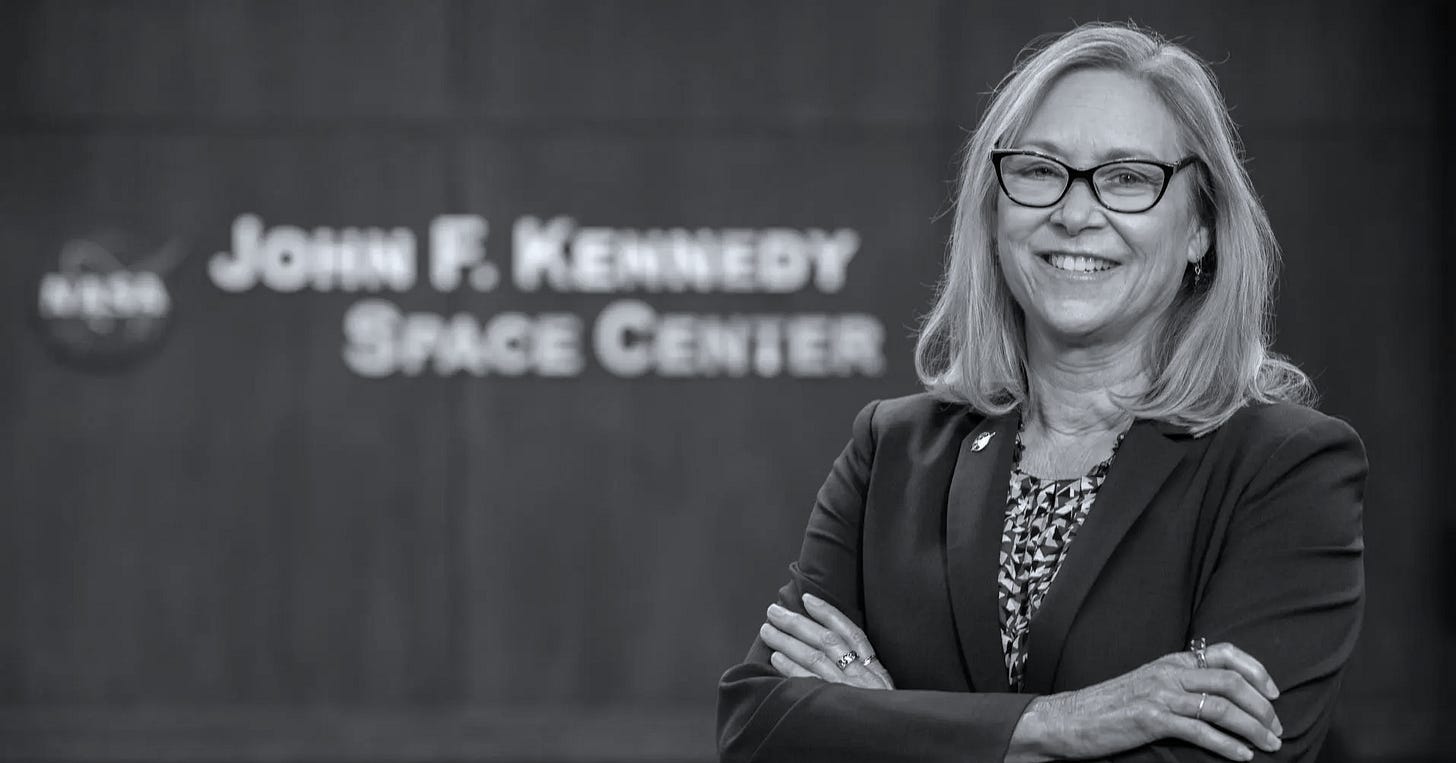Saving Dogecoin, top 25 AI VC investors, CoreWeaves's IPO value drops, crypto wallet startups, and other soft landings...

Elon's empire evolves as the TechBro backlash gets ugly
You can't say Elon is not taking one for the skipper. Tesla shares started to recoil on January 21, the day after President Trump's inauguration, when the Cowardly Lion took over as head of DOGE. Since that inglorious day, Elon has taken a $60 billion stock hit, pushing the value of his Tesla stock below his stake in SpaceX.
But save your crocodile tears for the Cowardly Lion. Despite Tesla's recent slump, the company's stock is still up 46 percent over the last year, and Elon remains the world's richest person (not counting Vlad and the Saudis).😭 The stock was also overvalued like the rest of BigTech, and the hit was part of the market correction.
The TechBro backlash in 2025 was our second prediction for the year. After witnessing the Biden/Harris in '20-voting 'Magnificent Seven' CEOs lining up at Mar-a-Lago to wash the feet of their new master, you could see it coming. But we didn't predict it would come with Molotov cocktails and stacks of death threats.😳
Since Elon's DOGE appointment, Tesla vehicles, dealerships, and charging stations have faced a notable wave of vandalism and arson attacks across the United States and beyond. A conservative, evidence-based estimate suggests total damages created by these incidents of at least $2.4 million thus far.
Breaking News
Multiple bombs and incendiary devices were found inside a Tesla showroom in Austin, Texas, today, as nationwide threats against CEO Elon Musk continue.😳 The Austin Police and Bomb Squad rushed to the scene and located multiple 'suspicious devices' at the Tesla dealership and took them into custody without incident. Since January 2025, at least 48 incidents of vandalism, arson, or other attacks on Tesla properties have been reported across nine states, reflecting a broader wave of hostility.
Meanwhile, reports have emerged of dramatic declines in Tesla car sales in the first two months of 2025 in Germany, China, and Australia, and analysts at JPMorgan recently cut their global deliveries forecast for the first quarter of 2025. Despite once being the darling of ‘progressives’ for cutting tens of millions of tons of CO2 from going into the ozone and making every auto company on the planet do the same, EDS is ramping up and is terrible for at least the Tesla business.
Finding the cost of freedom
Unfortunately, the BLM riots of the Summer of 2020 set a new modern pattern of using vandalism, arson, looting (a.k.a. smash and steal), and even the death of the innocent as a means of political protest. During the Summer of unrest, which affected over 100 cities, at least 19 innocent people were killed, insured property damage losses reached $2 billion, and uninsured losses were estimated to be three times that figure.😳 The ultimate irony was that the 19 innocent deaths were mostly people of color, and low-income neighborhoods suffered most of the property destruction.🤔

Sadly, the anti-Israeli protests, especially on 'elite' university campuses, have borrowed from these violent tactics. Since the Hamas attack on October 7, 2023, antisemitic incidents in the US have risen 360 percent, including vandalism and arson across all 50 states. Public spaces like libraries, public transportation, and streets have seen 1,540 Israel-related antisemitic incidents since 2023, many tied to anti-Israel protests. Instigators range from anti-Israel protesters to extremist groups, motivated primarily by political opposition to Israel, often expressed through antisemitic rhetoric and actions.
Not to pick a side here, but when you analyze the three protest movements that turned violent above, none of the perpetrators were wearing red hats.🤔 We all need to stand up to this craziness and reassert MLK Jr's example of nonviolent resistance because these protests are putting lives at risk.
"Gandhi was probably the first person in history to lift the love ethic of Jesus above mere interaction between individuals to a powerful and effective social force on a large scale. It was in this Gandhian emphasis on love and nonviolence that I discovered the method for social reform that I had been seeking. Christ furnished the spirit and motivation, while Gandhi furnished the method."
—The Reverand Martin Luther King, Jr., from a 1960 speech, ‘The Rising Tide of Racial Consciousness.’
Humility and a balance of perspective are required from both 'sides' of the political spectrum as the 'creative destruction' tsunami that is the norm for us in Silicon Valley is now engulfing our Federal government. The storm comes in the form of DOGE attempting to decentralize services and resources and modernize our government with the latest technology innovation and best operational practices.
We must remember, however, that swift change often spurs fear and loathing within some and can even cost lives if we are not careful. (See our letter to readers below re: USAID cuts).

Top VCs in AI for 2025
The following list presents the 27 venture capital funds that have invested in the greatest number of the 150 top private AI companies chosen for this year’s Cryptonite 300 (C300). For Silicon Valley insiders, nothing is surprising about what firms are on this list.
The Andreessen Horowitz fund dominance, as in 10 more C300 deals than the venerable Sequoia Capital, was a bit eyebrow-raising. It was interesting to see AI chipmaker Nvidia take over the helm from Intel Capital (still on the list, just lower) as the most prolific corporate VC.
Based on our history of picking great private companies, the bottom line is that the 27 funds on this list are going to make a sh*tload of money—and the AI VC action has just begun. According to our historical calculations, most of the great AI companies that will define the era have yet to be founded.

Given the ‘deep tech’ nature of AI and quantum computing, it makes sense that the average top VC fund on this list was founded, on average, 26 years ago (appropriately 1999🎉), and over half the funds are from San Francisco/Silicon Valley. The average assets of management numbers (AUM) are now all north of $1 billion, with an eye-watering average fund size of $25 billion💰💰💰! AI is a resource and talent and cash-hungry trade, and it helps to be at the center of the tech universe.
Global Silicon Valley companies backed by venture capital investors now generate half of the world's new jobs and wealth. It's good to take time once in a while to appreciate the crafty entrepreneurs and the swashbuckling risk investors who make it all happen! Keep up the good work, mates!

Andreessen Horowitz, Menlo Park, CA, USA, Founded 2009, ($35 billion)
28 C300 investments. Top AI companies: xAI, Databricks, Mistral AI, Genesis Therapeutics
NVentures (Nvidia), Santa Clara, CA, USA, Founded 2022
26 C300 investments. Top AI companies: xAI, Cohere, Databricks, OpenAI
Sequoia Capital, Menlo Park, CA, USA, Founded 1972, ($85 billion)
16 C300 investments. Top AI companies: Harvey, Glean, xAI, Glean
Coatue Management, New York, NY, USA, Founded 1999, ($50 billion)
14 C300 investments. Top AI companies: Scale AI, Hugging Face,
Khosla Ventures, Menlo Park, CA, USA, Founded 2004, ($15 billion)
13 C300 investments. Top AI companies: Cognition AI, Rad AI, OpenAI
Tiger Global Management, New York, NY, USA, Founded 2001, ($60 billion)
13 C300 investments. Top AI companies: Databricks, OpenAI, Databricks
General Catalyst, Cambridge, MA, USA, Founded 2000, ($28 billion)
13 C300 investments. Top AI companies: Hippocratic AI, Glean, Mistral AI
SV Angel, San Francisco, CA, USA, Founded 2009, ($500 million)
12 C300 investments. Top AI companies: Anthropic, Cerebras Systems, Formation Bio
Insight Partners, New York, NY, USA, Founded 1995, ($90 billion)
12 C300 investments. Top AI companies: Hugging Face, Weights & Biases, Abnormal Security, Writer
SoftBank Vision Fund, London & Tokyo, Japan, Founded 2017, ($100 billion)
12 C300 investments. Top AI companies: Perplexity, Safe Superintelligence (SSI), OpenAI
Lightspeed Venture Partners, Menlo Park, CA, Founded 2000. ($18 billion)
12 C300 investments. Top AI companies: Anthropic, xAI, Mistral AI
Spark Capital, Boston, MA, USA, Founded 2005, ($8 billion)
12 C300 investments. Top AI companies: Anthropic, Cyera, Abridge
GV (Google Ventures), Mountain View, CA, USA, Founded 2009, ($8 billion)
12 C300 investments. Top AI companies: Abridge, Harvey, Synthesia
Salesforce Ventures, San Francisco, CA, USA, Founded 2009, ($5 billion)
10 C300 investments. Top AI companies: Together AI, Cohere, Anthropic
New Enterprise Associates, Chevy Chase, MD, Founded 1977, ($25 billion)
10 C300 investments. Top AI companies: Databricks, Perplexity, Grammarly
Accel Partners, Palo Alto, CA, USA, Founded 1983, ($18 billion)
10 C300 investments. Top AI companies: Synthesia, Scale AI, Helsing
Founders Fund, San Francisco, CA, USA, Founded 2005 ($12 billion)
9 C300 investments. Top AI companies: xAI, OpenAI, Neuralink
Index Ventures, San Francisco & London, Founded 1996, ($12 billion)
9 C300 investments. Top AI companies: Perplexity, Cohere, Hebbia
Lux Capital, New York, NY, USA, Founded 2000, ($4 billion)
9 C300 investments. Top AI companies: Hugging Face, Runway, Together AI
Intel Capital, Santa Clara, CA, USA, Founded 1991, ($5 billion)
8 C300 investments. Top AI companies: SambaNova Systems, AI21 Labs, Anyscale
Sapphire Ventures, Palo Alto, CA, USA, Founded 2011, ($10 billion)
8 C300 investments. Top AI companies: Weights & Biases, 6sense, Sword Health
Y Combinator, Mountain View, CA, Founded 2005, ($4 billion)
8 C300 investments. Top AI companies: Hugging Face, Atomwise, OpenAI
Kleiner Perkins, Menlo Park, CA, USA, Founded 1972, ($10 billion)
7 C300 investments. Top AI companies: Hippocratic AI, Harvey, Codeium
Thrive Capital, New York City, USA, Founded 2008, ($16 billion)
7 C300 investments. Top AI companies: OpenAI, Scale AI, Formation Bio
Menlo Ventures, Menlo Park, CA, USA, Founded 1976, ($5 billion)
6 C300 investments. Top AI companies: Anthropic, Abnormal Security, Everlaw
Foundation Capital, Menlo Park, CA, USA, Founded 1995, ($6 billion)
6 C300 investments. Top AI companies: Eightfold AI, Amperity, Databricks
M12 (Microsoft), Seattle, New York, London, and Tel Aviv, Founded 2016,
6 C300 investments. Top AI companies: OpenAI, PsiQuantum, Databricks
Next week, we will be highlighting the VCs investing in the robotics, autonomous, and electric vehicles space, which has much crossover with the AI sector.
Paid members gain access to Cryptonite lists and data on the top 300 Web3 private companies, their VC investors, sector influencers, and IPO prospects. They also receive invites to Silicon Valley '25 and CPRO crypto rewards. Click the post below to subscribe and get on the inside. (And help feed the team😋)
The meme dream might be your (and Trump's) worst nightmare😱
There is much debate over whether Donald Trump's meme coin, $TRUMP, is legal or an abuse of Presidential power for personal gain. (And you all were pointing fingers at Nancy Pelosi for insider trading?🤔) Whether it is legal or not, it's tacky and, to borrow one of the Boogeyman's favorite catchphrases, 'it's a disgrace.'
When asked a question about the meme coin last week, the Boogeyman said he 'didn't know much about it other than I launched it and heard it was very successful.’ Until it fails—as it most certainly will.

Ark Invest's Bitcoin bull Cathie Wood says ‘most meme coins are not going to be worth very much.’ We agree. By declaring that meme coins are ‘not securities,' the newly crypto-savvy SEC is basically saying, ‘Investors are on their own with this craziness!’ $TRUMP may become a digital collector's item, but not at some ridiculous price—we learned that lesson during the NFT craze. Trumper’s beware!
"The combination of AI and blockchain technology is creating millions and millions of these meme coins. Our working assumption is that when you are talking about millions of meme coins, that's just a step too far, and most of them are not going to be worth very much. Only a few of these crypto assets will gain most of the spoils in the entire ecosystem.'
—Cathie Wood, founder, CEO, & Chief Investment Officer of ARK Investment Management, expects Bitcoin to reach $1.5 million by 2030.
The worst part of the meme nightmare is that we finally have a President, however begrudgingly (‘Bitcoin is a scam’ circa 2019) that 'gets' crypto (maybe too much 😭). He is totally tarnishing the cause via crypto-enrichment. The entire Trump clan needs to take a four-year break from playing at the crypto table or risk a backlash that stunts the movement and hurts everyone.
Trump’s AI and Crypto Czar David Sacks sold off his Bitcoin (BTC), Ethereum (ETH), and Solana (SOL), as well as other digital asset-related investments, totaling over $200 million. Mr. Sacks has publicly stated that he ‘would have preferred not to sell’ his holdings but did so because ‘government ethics rules required it.’🤔
Splashdown! Starliner astronauts back on Earth!
One would have thought the Cowardly Lion would have gotten some kudos for solving what Boeing apparently could not—which was bringing home two astronauts safely back to Earth in a timely fashion. Watch the very cool video of the elegant splashdown. This kind of excitement can bring our nation back together. Time to go to Mars 🚀
SpaceX, which launches satellites, cargo, and astronauts into orbit for government and commercial customers, grew its revenue by 51% to $13.1 billion in 2024, according to estimates by industry analysts Payload Space. Estimated revenue from SpaceX's Starlink satellite internet service nearly doubled to $8.2 billion.
“We are thrilled to have Suni, Butch, Nick, and Aleksandr home after their months-long mission conducting vital science, technology demonstrations, and maintenance aboard the International Space Station. Per President Trump's direction, NASA and SpaceX worked diligently to pull the schedule a month earlier. This international crew and our teams on the ground embraced the Administration's challenge of an updated and somewhat unique mission plan to bring our crew home. Through preparation, ingenuity, and dedication, we achieve great things together for the benefit of humanity, pushing the boundaries of what is possible from low Earth orbit to the Moon and Mars.'
—NASA acting Administrator Janet Petro said in a statement.

X raises a $billion
Elon is edging back toward the initial $44 billion valuation he paid for the then-dying Twitter brand by raising $1 billion in new equity for X at a valuation of $32 billion. Huff puff😅. The Cowardly Lion threw in some of his cash to keep his percentage stake (~79 percent) in the global chart room alongside new investors like Darsana Capital Partners and 1789 Capital. The new money will help pay down X’s $13 billion in debt and continue to grow the business.

After a sharp decline in ad revenues (a reported 50%+ drop in 2023) due to Madison Avenue's backlash against Elon's move to a community content moderation model, X is on its way back up under the charismatic leadership of CEO Linda Yaccarino, who assumed the role in June 2023.
It may be too early for the Cowardly Lion to take a bow for the X turnaround, but prior to its sale Twitter was on the verge of becoming obsolete, with a mere 28 percent of its users saying they would be disappointed if the disappeared, down from 33 percent in 2020, according to a Verge Tech Survey,
Today, 48 percent of X members lean Democratic, and 47 percent lean Republican, versus the old Twitter, where 69 percent of the members lean Democrat. Further, according to a new Pew survey, 89% of members who lean Republican and 86% of those who lean Democrat feel free to express their political views. X is now the most bipartisan, trusted social network on the planet.
How Elon can save the Dogecoin
The Cowardly Lion knows there is no tokenomics behind the cryptocurrency he named after his dog. Elon knows that meme coins will meet the exact fate that Cathie Woods describes above. He finally had to admit on SNL back on May 8, 2021, that Dogecoin is 'a hustle' (see video clip below), and Dogecoin's price plummeted 29.5% that night after reaching its all-time high of $0.7376 the day before.
If we were Elon, we would invest his 28 percent ownership stake in Dogecoin in X and secure an even higher stake. We would then turn the Dogecoin into the reward and payment coin for the X community. This way, X could create an economic alignment with its members by quantifying and rewarding community activity and engagement with Dogecoins. Members could then use their Dogecoins to reward and subscribe to other members, purchase discounted products and services, or buy and trade the former meme coin on exchanges for cash or other cryptocurrencies.
There is a waterfall of valuable and untapped expert knowledge and perspective on X with no reward to the creators. You could create a marketplace on X where smart people can share their intellectual capital and allow Dogecoins to have direct message access and other value. Think of it as the 'OnlyFans for Nerds.'
Historically, the greatest value found in most social networks has been within interest-niche forums and groups. X could sell the ability for members to create DAO (decentralized autonomous organizations)-governed branded tribes to which members could subscribe and gain more value.
As Reed's Law underscores, as the number of tribes multiplies, the economic value and network effects of X grow exponentially. The more the network effects drive enterprise value, the more Dogecoin shoots up in value. If executed properly, Dogecoin's value will represent the perceived value of being a member of X.
Members could also reward Dogecoins for recruiting quality new members to the community and earn NFT badges representing membership status and credentials for specific network achievements. Combined, these forms of compensation and recognition would provide X members with a long-term, karma-like stake in the network's success.
X would boost its revenues by earning 'gas money' on every Dogecoin transaction, and the company’s Dogecoin stash would skyrocket in price. Along the way, X could sell a slug of its Dogecoin, pay off its leveraged debt, and become Elon's most valuable asset. 🤷🏻♀️
xAI follows OpenAI in the AI infrastructure business
Elon's xAI has joined a consortium (a.k.a., the AI Infrastructure Partnership) that includes Microsoft, Blackrock, and Abu Dhabi sovereign fund MGX. The consortium plans to raise $100 billion to develop AI data centers and power plants. MGX is also part of Stargate, a joint venture with OpenAI, Oracle, and SoftBank to develop AI data centers in Texas.

xAI may not be the only AI developer that uses the eventual data centers, as the partnership mission is to support a ‘diverse range of partners on a non-exclusive basis.’
Less Coreweave IPO stock at a lower value
Silicon Valley insiders say CoreWeave is planning to sell about $2.5 billion of its IPO stock, less than the original plan to sell $4 billion. The company had difficulties filling out its IPO investor prospect list around its original stock valuation goal of $35 billion and has since set a new target of $32 billion. Our position is that private AI companies' valuations are all bubbled up, and Coreweave's IPO value will land closer to $26 billion on a fully diluted basis.
CoreWeave was last valued at $23 billion in November 2024 when it closed its last round of equity provided by Coatue Management, Nvidia, Cisco, and BlackRock. One of these issues is that three-quarters of Coreweaves' revenues came from just two customers last year, and it carries significant debt, even as it's growing rapidly.
Mistral is pioneering open AI (and staying private)
Coreweave may be making the IPO leap, but Paris-based Mistral AI's CEO Arthur Mensch denies any IPO plans and smartly touts his company's relentless focus on open source instead to outflank deeper-pocketed competitors such as xAI and OpenAI and compete with China's DeepSeek.

Mistral's cofounders are formerly from Google DeepMind and Meta’s AI research lab. They emerged out of stealth mode in 2023 with $113 million in seed funding—the largest seed funding round in European history. The company has raised $1 billion to date, including a $640 million Series B round that valued it at a whopping $6 billion.😳 Key early backers include Cryptonite top 25 AI VCs, General Catalyst, Andreessen Horowitz, and Lightspeed Venture Partners.
Crypto wallets 3.0
New York-based crypto wallet infrastructure company Privy raised $15 million in a new round led by Ribbit Capital. The round also included top 25 blockchain funds Sequoia Capital, Paradigm, and Coinbase. Privy's total funding to date is now over $40 million.

Since Privy’s previous funding round in 2023, the company has grown to 50 million accounts and works with 1,000 businesses, ranging from the restaurant loyalty company Blackbird to the NFT marketplace OpenSea.
Another crypto wallet provider, Utila, raised $18 million, inspired by soaring institutional demand for managing digital assets and stablecoins. Utila has experienced a fresh wave of demand for digital asset infrastructure from payment providers, fintech firms, and neobanks.
Utila’s new round was led by Nyca Partners and included Wing VC, NFX, Haymaker Ventures, Gaingels, and Cerca Partners. The latest round brings the startup's total venture capital funding to around $30 million since emerging from stealth last year.

Letter to a Weekly Rap reader re: USAID cuts
Dear valued reader:
Thank you for reminding us that there are, indeed, life-and-death consequences that may result from an overenthusiasm for 'chainsawing' the bureaucracy—as we inelegantly described it in last week’s Rap.
In your note, you directed us to an interview in The New Yorker with Atul Gawande, the former assistant administrator for the Bureau of Global Health at the US Agency for International Development (USAID). Our xAI search shows that USAID had a $43.8 billion budget in 2023. After a DOGE review in February, the agency was moved under the State Department ‘to realign foreign aid with U.S. diplomatic objectives.' Eighty-three percent of the USAID programs were also eliminated, and its headcount was reduced from ~13,000 people to ~3,200.

In the interview, Dr. Atul explained that USAID aims to protect Americans from disease outbreaks abroad by working with countries to reduce H.I.V./aids and other infectious diseases like malaria and TB. During COVID-19, the good Doctor says that USAID vaccinated 300 million people worldwide and, by doing so, saved 1.2 million lives. (Seven million lives were lost to COVID-19.) We will leave our readers to argue all sides of this controversial subject, but side effects, where COVID-19 originated, etc., aside, Dr. Atul's claim is mathematically plausible.
In the interview, Dr. Atul also breathlessly expressed his alarm due to the agency's downsizing: 'The internal estimates are that more than 160,000 people will die from malaria per year. Hundreds of thousands of the 20 million people dependent on H.I.V. medicines will die in Year One. On the immunization side, you're talking about more than a million estimated deaths.'
This is a complicated subject and clearly not in our lane of expertise. Our research shows that Dr. Atul's concerns are real, and we believe that recognizing and addressing these concerns should be a very high priority given the number of potential lives at risk according to his claims. Isn't the Trump administration positioned as the 'pro-life,' 'stop the killing' Presidency? The Boogeyman and Secretary of State Marco Rubio clearly have some explaining to do to address Dr. Atul's claims and assure the American people that his nightmare scenario will not come true.
Journalistically, we concede to being cavalier with our initial observations and offer this as our correction for failing to investigate the bigger ramifications of some of the proposed foreign aid cuts. This being said, if we are held to that standard, the Almighty New Yorker certainly should be as well.
Like all US government agencies, USAID is a bloated and inefficient operation that wastes billions of taxpayers' money on unnecessary overhead and inane, ideologically driven projects that pander to the political interests of a tiny minority of US citizens. DOGE proved this, and the New Yorker's fawning and puffy interview did not go near that topic. As an example, where was that nagging question of how to justify $43.8 billion in foreign handouts when the man who appointed Dr. Atul racked up another $7 trillion in new debt? These are the FACTS.
The American people are generous by nature, and we bet that most want to stop the needless killing in the Ukraine War and from diseases in developing countries that are treatable. If, indeed, 'hundreds of thousands of lives' are imminently at risk, both sides need to come clean and make their case to the American people who are currently in the dark.
The math says 17 percent of the USAID budget and 3,200 workers are still intact. Where are these monies and resources going? Where are the shortfalls? So far, the silence on both sides is deafening and could get deathening.
Note to the Cowardly Lion: A little expression of empathy and support for those affected by the DOGE cuts would go a long way and may stop the Molotov cocktails from flying. Note to Dr. Atul: Seven more trillion in deficits under your boss's administration have pushed the price of a dozen eggs to $12. Show some mercy and tell us where to cut the fat at USAID without losing a life. No one better than you to help with this.
A model for providing efficient and compassionate care
The Missionaries of Charity (MoC), founded by Mother Teresa, are active in over 130 countries, with missions established in places like India, the United States, Yemen, Russia, China, and many countries in Latin America and Africa. The sisters dedicate their lives to serving refugees, the sick, abandoned children, lepers, people with AIDS, the elderly, the destitute, and the dying. They operate hundreds of homes, schools, soup kitchens, and clinics, providing direct care and support.
For context, Catholic Charities USA, which operates domestically, reportedly served more than 15 million people in 2024. Given the Missionaries of Charity's broader international scope, their annual reach is likely to be in the millions, though they don't track these numbers.
Unlike larger NGOs or foundations, the sisters operate with a philosophy of poverty, chastity, obedience, and reliance on grassroots support. As part of their vows, they often beg for food and supplies. The sisters avoid taking large endowments or government funding. They also rely on in-kind donations and the 'Co-Workers of Mother Teresa' and other volunteers.
By one estimate, a $1 donation to MoC buys 20 meals, while $1 given to USAID buys 1 meal when you factor in its overhead. By its nature, MoC carries zero administrative costs and salaries and has no contracts with NGOs or for-profit firms. USAID offers a scale that MoC can't achieve in areas like mass vaccinations.
The new reality is Web3 innovation, and the DOGE program is part of a broader decentralization of power and resources movement in both the public and private sectors. There is not a single politician or bureaucrat that can stop this shift because it eliminates the need for often highly politicized intermediaries and puts resources directly in the hands of locally engaged helpers closest to the origin of the need.
Since the beginning of our nation, it has been a basic principle that the federal government should be the service agency of last resort. This approach helps to avoid corruption and fosters local authority and services. With Web3 and the tech world helping to modernize our governments, we are going back to the future, and it's exciting. Our citizens will end up more empowered and better served.
We are experiencing the first pangs and pains of this transition, so we, in the business of innovation, have to be good communicators. Our message to the people should be that the sooner we embrace the decentralizing power of Web3 innovation, the less painful the adjustment will be, the faster it will happen, and the better we will serve US citizens and the folks falling through the cracks of society.
Introducing the Cryptonite 300 competition
Somewhere between the raw startups and the Unicorns are the blockchain, AI, and metaverse companies pioneering Web3 and offering the best equity investment ROI potential in the global Silicon Valley.
What you get behind the ‘paywall’ as a paid Cryptonite member
List and data profiles on 3,500 venture capital-backed AI/ML companies and blockchain/crypto companies, over 240 of which have made the Cryptonite 300 nomination list thus far.
List of the top Venture Capital funds that invest in the top 300 private Web3 companies.
List of the top Web3 Influencers as ranked by top deal relationships.
The ability to nominate companies to the Cryptonite 300 competition for 2025!
Invitations to private Cryptonite events, including Silicon Valley ‘25.
















